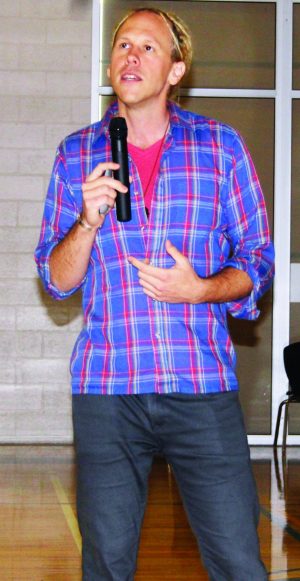Speaker discusses doing one job per week for 52 weeks
By Rob Vogt Local Press Writer
What do you want to be when you grow up? It is a question asked of virtually every young person at some point or another. Sean Aiken says the true way to find the answer is by experiencing as much as possible to discover what your true passion is. In his case, he embarked on a project that saw him do 52 jobs in 52 weeks across North America. He shared some of those experiences with students at an assembly at Willow Creek Composite High School on Oct. 24. Aiken said students are told they can be anyone they want to be. He disagrees. “You can only be you,” he said. “You can only be better at being you. “You are already someone to behold.” Moreover, he does not want to know what you can be. “I want to know how you can be,” Aiken said. He then took students back to the day he went bungee jumping for the first time. It was week one of the job project that would see him do one job a week for 52 weeks. He wanted to find out what made him come alive. After Aiken graduated from college, he had sunk into a depression. Everyone else seemed to know what to do except him. “I have no idea what the next year will hold,” he said he was thinking. There was a lot to worry about – job offers, money, where to stay and more. Aiken was scared but excited. So he made the jump – both physically and symbolically – into the unknown. Aiken then took students back to his youth, when he was first asked, “What do you want to be when you grow up?” He was five, and back then the answer was easy – He-Man. Aiken described the question as an invitation to dream. By high school instead of possibilities, there were expectations, and you were supposed to know. “It’s okay not to know,” he said. Aiken encouraged students to use the time in school to try as many things as they can to learn about themselves. In his case, he started a website where anyone in the world could offer him any job for a week. To that point, Aiken had had limited job experience. What he discovered was, once he put his project out into the world, he was not alone. “It gave courage and permission to so many other people to join that conversation,” he said. Aiken would go on to do a wide range of jobs. Most weeks he felt uncomfortable. “I just had this willingness to try,” he said. He would sell real estate, be a firefighter, and was even the mascot for the Washington Capitals hockey team. He worked at a Canadian Forces base in Trenton, Ontario doing search and rescue and flying helicopters. He was the producer of the last “Rambo” film, and a yoga instructor in Edmonton. His first day there, he was freezing in the cold February Edmonton winter and thought he was more comfortable outside then actually going into the studio. For four days he learned about yoga and, on the fifth day, he taught a class. What stands out there is the conversation he had with Henri, the instructor he worked for. Aiken recognized it was the first real communication he had with someone from a generation other than his own. It was the first real, authentic conversation he had. He recognized people are not often willing to let you into their life to let them support you. He realized he did not have to pretend to know everything, or that he didn’t need help. “It’s hard to ask for help,” he said. When someone finds they need help the most, that’s when it’s the hardest to ask for help. Aiken said he could not wait to get out of school, later realizing he did not get the help available from others. He encouraged students again to try out as much as possible in school. Aiken discussed more of his jobs such as working in an aquarium; bartending; being a fashion designer in New York; making pizzas; and being a cowboy in Wyoming. He worked in Wyoming with a cowboy named Chet. They would mount horses and check on cattle, and it was calving season. That gave Aiken time to have really great conversations with Chet. He noticed how Chet talked about his failures. There was no regret, but instead a sense of pride. He was quick to say what he learned from failure. “I always thought of failure as a negative thing,” Aiken said. In high school, he did not try because he was afraid to fail. Chet learned from failure and it got him one step closer to what he wanted to do. Aiken said that only by trying, failing, and learning do you get closer to your goal. “Failing forward,” he said. “It’s not a step back.” Aiken worked at a flower shop; as a park ranger; and in the last week of the project he was mayor of Vancouver, his hometown. Overall, he travelled more than 70,000 kilometres and raised more than $20,000 for the make poverty history campaign. That came from employers donating his wages to the campaign. He was able to survive because a sponsor provided $1,000 per month, which paid for everything. He also usually stayed with his employers or people who heard about his project and supported him. Aiken discovered his passion was to explore, learn, and teach others. “That’s what I’ve been doing now,” he said, adding he now comes from a place where he’s excited about what he’s doing. He noted experts have said people will have eight to 10 distinct careers in their lives. Aiken then talked about a job where he worked with a speaker in Denver. Together they had lunch with a good friend of the speaker’s, named Lee, who had built a business worth more than $200 million. As Aiken talked about his project, Lee became reflective. Finally, he said he wished he could just be a coach. Then with hurt and hope mixed with regret he said, “Some day.” Aiken asked Lee what he would do differently in his life. He responded he would have acted without fear of what others thought. Aiken asked students how often are choices based on fear and what other people think? When he was in school, every decision was based on that. Often fear is associated as a risk. Yet, if you are doing anything worthwhile, there is always fear mixed with excitement. “It’s a sign that you care,” Aiken said. He urged people to ask what would you do if you weren’t afraid. Then he concluded by quoting Jack Kerouac. The ones crazy enough to think they can change the world – actually do.


